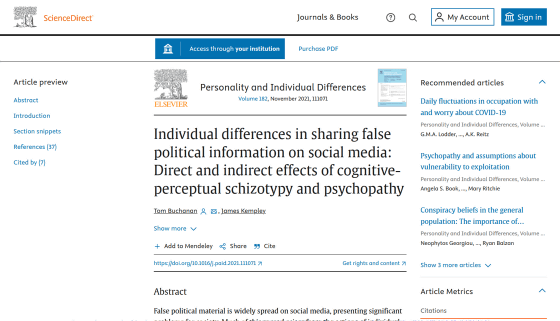Some people who spread fake news knowing that it's actually a lie, do so on purpose because they think it's ``good for the world.''

In order to minimize the impact of false rumors and rumors that are flooding SNS etc., it is important not to spread fake news. However, some people who are spreading fake news think, ``I know it's fake news, but spreading it will be good for the world,'' and they do so on purpose. ... apparently ...
Individual differences in sharing false political information on social media: Direct and indirect effects of cognitive-perceptual schizotypy and psychopathy - ScienceDirect

Some people who share fake news on social media actually think they're helping the world
https://theconversation.com/some-people-who-share-fake-news-on-social-media-actually-think-theyre-helping-the-world-215623
In modern social media, many people share and spread political news, but the possibility of fake news slipping into the mix is increasing. According to the World Economic Forum , fake news will become the most serious global risk from 2024 to 2025, and there are concerns that the spread of fake news will accelerate social and political divisions.
Some of the fake news shared on social media is spread by paid ads and bots. However, we also know that ordinary social media users , not bots, are the most influential in spreading fake news.
Tom Buchanan , a psychology professor at the University of Westminster in the UK, and his colleagues conducted an online survey of 1,000 people living in the United States to determine the rate at which people spread fake news and their psychology. I researched it.
As a result of the survey, approximately 20% of people answered, ``I have spread information that later turned out to be fake news without realizing it was fake.'' However, approximately 10% of people answered that they had spread political fake news that they knew was a lie, indicating that some people intentionally spread fake news. Ta.

Although the percentage of people who intentionally spread fake news is by no means large, given the scale of social media, fake news can spread like wildfire if only a few people spread it. As a result, people run the risk of having difficulty obtaining reliable news or believing in fake news.
Previous
However, some people intentionally spread fake news to attack or manipulate others. These people often use fake news to influence the political views of others, either by supporting smear campaigns against politicians they dislike, or by enhancing the reputations of politicians they support. there is. Buchanan and his colleagues point out that for those who spread fake news with a purpose, it is not so important whether the content is true or not, and the person himself is indifferent to its harmfulness.
In contrast to these people, there were others who shared fake news with complete good intentions. These people believed that sharing the news, whether it was true or false, would make the world a better place. For example, when a serious infectious disease is prevalent, spreading fake news that exaggerates the dangers of a serious infectious disease can be used to encourage people to put more effort into preventing infection.

Buchanan and his colleagues point out that popular fake news often arouses negative emotions or strongly appeals to moral sensibilities. Therefore, when we see someone we know on social media sharing fake news, we tend to warn them strongly or block them. However, there are cases in which giving harsh opinions or exposing others can have the opposite effect, as shown by research showing that people who are told about fake news become more biased in their opinions.
To combat fake news while avoiding these negative effects, it is best to follow the platform's official guidance and report it as fake news using the report form. Buchanan and his colleagues also advised that if you find yourself wanting to share fake news for some reason, you should hold back that feeling and look for another way to convey the same message.
Related Posts:
in Mobile, Web Service, Science, Posted by log1h_ik







